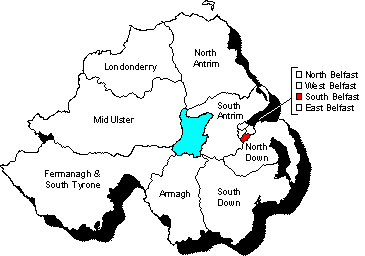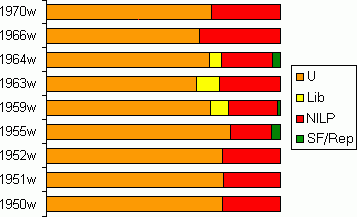

 |

|
|
|
|
|

|

|
| Map and diagram by Conal Kelly | |
Established in 1920, this constituency consists of the southern quarter of the city of Belfast. Between 1950 and 1970 the constituency was represented by three different MPs, all of whom were Unionist. All elections held during this period were contested.
See also election results for South Belfast 1973-1982, 1983-1992 and 1993-2007.
| U | Lib | NILP | SF/Rep | |
| 1970w | 70.4% | 29.6% | ||
| 1966w | 65.4% | 34.6% | ||
| 1964w | 69.8% | 4.9% | 22.4% | 2.9% |
| 1963w-b | 64.3% | 9.9% | 25.8% | |
| 1959w | 69.9% | 7.5% | 21.6% | 1.0% |
| 1955w | 78.4% | 17.6% | 3.9% | |
| 1952w-b | 75.1% | 24.9% | ||
| 1951w | 75.8% | 24.2% | ||
| 1950w | 75.2% | 24.8% |
Unionist majority: 15,956; electorate: 57,112; votes cast: 68.4%
In this his penultimate
Westminster contest, Rafton Pounder once again squared off with the NILP
in South Belfast. The NILP selected a new candidate, John Coulthard, and
were hoping to further improve on their 1966 performance. However on a higher
turnout, the NILP share of the poll slipped under 30% and Pounder was
returned to Westminster in what would prove to be his final term. This was
the Unionists' best result in 1970.
Pounder was appointed Private Secretary to the Secretary of State of
Trade and Industry in the new government, and served until 1971.
He was also part of the UK delegation to the
European Parliament (1973-4). John Coulthard had also stood
unsuccessfully for the Northern Ireland House of Commons in 1968 (South
Antrim) and 1969
(Belfast Victoria). He also stood unsuccessfully in East Belfast for
the 1973 Assembly.
Unionist majority: 10,965; electorate: 56,381; votes cast: 63.3%
The incumbent Pounder
once again defended his seat in the general election of 1966. His sole
competition came from the NILP, fielding a new candidate, Erskine Holmes.
Holmes polled well, capturing over 34% of the vote and giving the NILP their
best ever result in South Belfast. His majority cut to just under 11,000 votes,
Pounder was returned to Westminster for a third term.
Holmes stood unsuccessfully in the Belfast Ballynafeigh constituency for the
Northern Ireland House of Commons in 1965 and 1969. He also stood unsuccessfully
in South Belfast for the 1973 Assembly and the 1975 Constitutional Convention.
Unionist majority: 18,630; electorate: 57,558; votes cast: 68.3%
Having been elected
just one year earlier, the incumbent Rafton Pounder returned to the
hustings to defend his seat in the 1964 general election. As was the case
a year earlier, he faced opponents from both the NILP and the Liberals. In
addition, Bobby McKnight, a former IRA leader who had been jailed during the
IRA's Border Campaign, was contesting the election as a Republican (Sinn Fein
now being a proscribed organisation). In the end Pounder managed to comfortably
top the poll and was returned to Westminster with an increased majority of over
18,000.
Barkley later stood unsuccessfully for the Northern Ireland House of Commons
in 1965 and 1969 for the Belfast Cromac constituency. Rosenfield had previously
stood unsuccessfully for the Northern Ireland House of Commons in 1962 for the
Belfast Ballynafeigh constituency.
Unionist majority: 10,780; electorate 57,864; votes cast: 48.3%
Sir David Campbell
died on 12 June 1963 at the age of 72, having represented South Belfast since
1952. The resulting by-election was held in October of that year and the
Unionists selected QUB internal auditor, Rafton Pounder, as their candidate.
Norman Searight once again represented the NILP as had been the case in
1959, while the Liberals opted for a new candidate in Albert Hamilton.
Sinn Fein did not contest the election. In a turnout of less than 50%, Pounder
managed to capture 64% of the poll and was elected with a majority of over
10,000.
Searight had stood unsuccessfully for the Northern Ireland House of Commons
in 1962 for the Belfast Willowfield constituency. Hamilton would later
run unsuccessfully for the Northern Ireland House of Commons in 1965 for
the Mid Armagh constituency.
Unionist majority: 20,846; electorate: 59,864; votes cast: 72.1%
The incumbent Campbell
defended his seat for the second and final time in the 1959 general election.
South Belfast had a record four candidates, the most of any constituency in
Northern Ireland. The NILP and Sinn Fein, who had challenged the incumbent in
1955, were also joined by the Liberal Party who were contesting their one and
only seat of the election. Never really in any doubt, Campbell once again
topped the poll, although with a slightly reduced majority, and was returned
for his third term at Westminster. The NILP managed to capture over 21% of the
poll, recovering somewhat from their poor 1955 performance. Noteworthy is the
total collapse of the Sinn Fein vote due largely to the IRA's on-going and
divisive Operation Harvest campaign.
Searight had also stood unsuccessfully for the Northern Ireland House of
Commons in 1953 and 1958 for the Belfast Willowfield constituency.
Sheelagh Murnaghan would later unsuccessfully contest North Down in the
1966 Westminster general election. Murnaghan was the only person to be
elected to Stormont as a Liberal candidate.
Unionist majority: 25,884; electorate: 64,844; votes cast: 65.7%
Having been elected
in the 1952 by-election, the incumbent Campbell was defending his seat for
the first time in the 1955 general election. His principal opposition came
once again from the NILP who were fielding a new candidate, Edward Brown.
This election also came at a time of increased militant republican activity.
In October 1954 the IRA had attempted a raid on Omagh Barracks in order to
capture weapons for their planned Operation Harvest. The raid was a failure
and led to the capture of eight IRA members. One of those captured and
imprisoned for his part in the raid was Patrick Kearney. While imprisoned
Kearney was subsequently selected to represent Sinn Fein in South Belfast.
The result, however, was not unexpected with Campbell topping the
poll and increasing his majority to almost 26,000. It was a disappointing
result for the NILP who were not helped by the presence of another
non-unionist candidate. Sinn Fein captured just under 4% of the poll, their
second worst result of the election.
Brown also stood unsuccessfully in South Antrim in
the 1950 Westminster elections.
Unionist majority: 15,412; electorate 66,196; votes cast: 46.4%
Gage, who had
represented the constituency since 1945, resigned his seat in 1952
and the resulting by-election was held in November of that year. The
Unionists selected Sir David Campbell as their candidate, while the
NILP put forward Party Secretary Sam Napier. In this the third
election in less than three years, the outcome was very much the
same with the Unionist candidate capturing just over 75% of the poll.
Napier also stood unsuccessfully for the Northern Ireland House
of Commons in 1949 (North Down) and 1953 (Queens University).
Unionist majority: 25,231; electorate: 66,212; votes cast: 73.8%
Seeking a third
and what would be his final term, Conolly Gage once again represented the
Unionists in South Belfast. The NILP fielded the only opposition, with
their new candidate Robert McBrinn. In an almost identical result to the
1950 election, Gage was returned with a very comfortable majority in
excess of 25,000.
McBrinn had also stood unsuccessfully for the Northern Ireland House of
Commons in the 1945 general election for Belfast Willowfield.
Unionist majority: 23,192; electorate: 66,486; votes cast: 69.3%
The incumbent Conolly Gage had been first elected in 1945 and undertook the first defense of his seat in the 1950 general election. His sole opponent was James McKernan, representing the NILP. In the 1945 election, the Labour vote had been split in South Belfast with both an NILP candidate and a Commonwealth Labour Party (CWLP) candidate competing. Together they had captured just under 48% of the vote, so with a single Labour candidate expectations were running high. In the end, although the NILP improved slightly, they were unable to harness the CWLP vote of 1945 and Gage was returned with a majority of over 23,000.
See also:
Results from 1950 to 1970 for each seat: East Belfast | North Belfast | South Belfast | West Belfast | North Antrim | South Antrim | Armagh | North Down | South Down | Fermanagh and South Tyrone | Londonderry | Mid Ulster
Other sites based at ARK: ORB (Online Research Bank) | CAIN (Conflict Archive on the INternet) | Northern Ireland Life and Times Survey
Your comments, please! Send an email to me at nicholas.whyte@gmail.com.
Conal Kelly, 1 June 2007.
|
Disclaimer:©
Nicholas Whyte 1998-2004 Last Updated on Wednesday, 12-Jan-2005 12:12
|